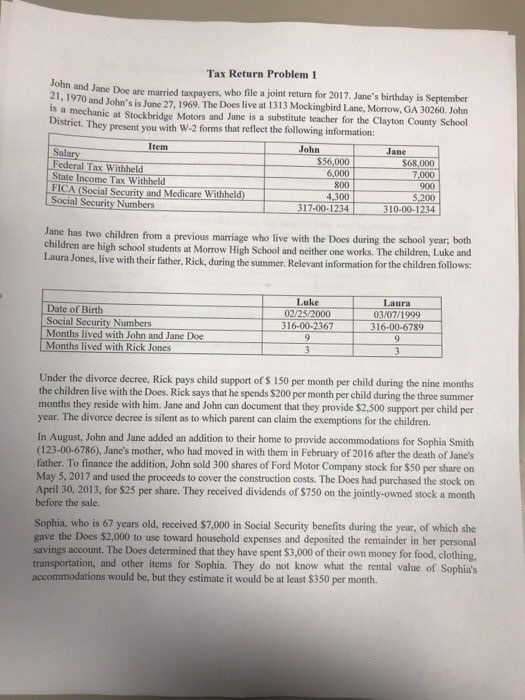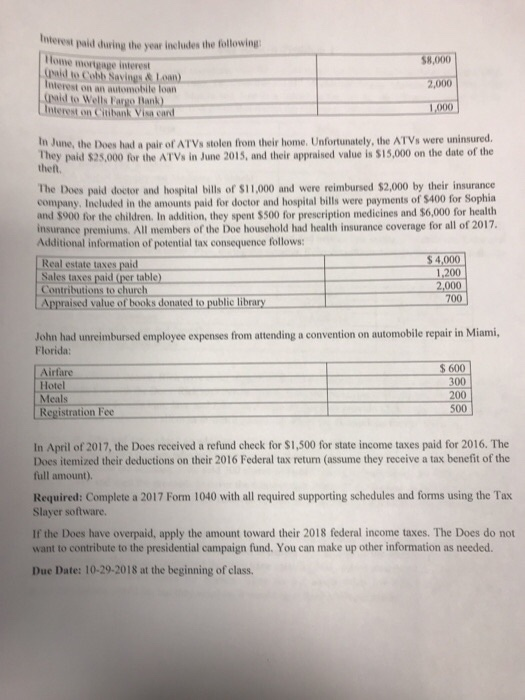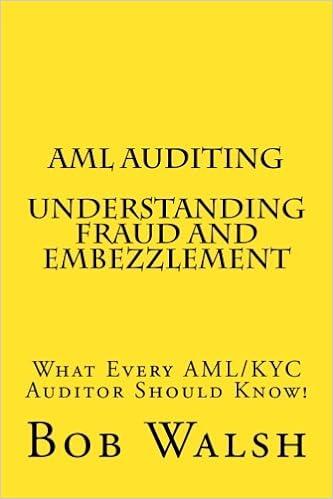Tax Return Problem 1 John and Jane Doe are married taxpayers, who file a joint return for 2017. Jane's birthday is September 21, 1970 and John's is June 27, 1969. The Does live at 1313 Mockingbird Lane, Morrow, GA 30260. John 15 a mechanic at Stockbridge Motors and Jane is a substitute teacher for the Clayton County School District. They present you with W-2 forms that reflect the following information: Item Salary Federal Tax Withheld State Income Tax Withheld FICA (Social Security and Medicare Withheld) Social Security Numbers Jane $68,000 7.000 John $56,000 6,000 800 4,300 317-00-1234 900 5.200 3 10-00-1234 Jane has two children from a previous marriage who live with the Does during the school year: both children are high school students at Morrow High School and neither one works. The children, Luke and Laura Jones, live with their father, Rick, during the summer. Relevant information for the children follows: Luke 0225 2000 316-00-2367 Laura 01/07/1999 316-00-6789 Date of Birth Social Security Numbers Months lived with John and Jane Doe Months lived with Rick Jones Under the divorce decree, Rick pays child support of $ 150 per month per child during the nine months the children live with the Does. Rick says that he spends $200 per month per child during the three summer months they reside with him. Jane and John can document that they provide $2,500 support per child per year. The divorce decree is silent as to which parent can claim the exemptions for the children. In August, John and Jane added an addition to their home to provide accommodations for Sophia Smith (123-00-6786), Jane's mother, who had moved in with them in February of 2016 after the death of Jane's father. To finance the addition, John sold 300 shares of Ford Motor Company stock for $50 per share on May 5, 2017 and used the proceeds to cover the construction costs. The Does had purchased the stock on April 30, 2013, for $25 per share. They received dividends of $750 on the jointly-owned stock a month before the sale. Sophia, who is 67 years old, received $7,000 in Social Security benefits during the year, of which she gave the Does $2,000 to use toward household expenses and deposited the remainder in her personal savings account. The Does determined that they have spent $3,000 of their own money for food, clothing, transportation, and other items for Sophia. They do not know what the rental value of Sophia's accommodations would be, but they estimate it would be at least $350 per month 58.000 terest paid during the year includes the following Home m e interest to Cobb Savings lan) Interest on an automobile loan to Wells Fargo llank) Interest on Citibank Visa card 2,000 1,000 In June, the Does had a pair of ATVs stolen from their home. Unfortunately, the ATVs were uninsured. They paid $25.000 for the ATVs in June 2015, and their appraised value is $15,000 on the date of the theft The Does paid doctor and hospital wills of $11,000 and were reimbursed $2,000 by their insurance company. Included in the amounts paid for doctor and hospital bills were payments of $400 for Sophia and $900 for the children. In addition, they spent $500 for prescription medicines and 56,000 for health insurance premiums. All members of the Doe household had health insurance coverage for all of 2017. Additional information of potential tax consequence follows: Real estate taxes paid $4,000 Sales taxes paid (per table) 1,200 Contributions to church 2,000 Appraised value of books donated to public library 700 John had unreimbursed employee expenses from attending a convention on automobile repair in Miami, Florida: Airfare $ 600 Hotel 300 Meals 200 Registration Fee 500 In April of 2017, the Does received a refund check for $1,500 for state income taxes paid for 2016. The Does itemized their deductions on their 2016 Federal tax return (assume they receive a tax benefit of the full amount). Required: Complete a 2017 Form 1040 with all required supporting schedules and forms using the Tax Slayer software. If the Does have overpaid, apply the amount toward their 2018 federal income taxes. The Does do not want to contribute to the presidential campaign fund. You can make up other information as needed. Due Date: 10-29-2018 at the beginning of class, Tax Return Problem 1 John and Jane Doe are married taxpayers, who file a joint return for 2017. Jane's birthday is September 21, 1970 and John's is June 27, 1969. The Does live at 1313 Mockingbird Lane, Morrow, GA 30260. John 15 a mechanic at Stockbridge Motors and Jane is a substitute teacher for the Clayton County School District. They present you with W-2 forms that reflect the following information: Item Salary Federal Tax Withheld State Income Tax Withheld FICA (Social Security and Medicare Withheld) Social Security Numbers Jane $68,000 7.000 John $56,000 6,000 800 4,300 317-00-1234 900 5.200 3 10-00-1234 Jane has two children from a previous marriage who live with the Does during the school year: both children are high school students at Morrow High School and neither one works. The children, Luke and Laura Jones, live with their father, Rick, during the summer. Relevant information for the children follows: Luke 0225 2000 316-00-2367 Laura 01/07/1999 316-00-6789 Date of Birth Social Security Numbers Months lived with John and Jane Doe Months lived with Rick Jones Under the divorce decree, Rick pays child support of $ 150 per month per child during the nine months the children live with the Does. Rick says that he spends $200 per month per child during the three summer months they reside with him. Jane and John can document that they provide $2,500 support per child per year. The divorce decree is silent as to which parent can claim the exemptions for the children. In August, John and Jane added an addition to their home to provide accommodations for Sophia Smith (123-00-6786), Jane's mother, who had moved in with them in February of 2016 after the death of Jane's father. To finance the addition, John sold 300 shares of Ford Motor Company stock for $50 per share on May 5, 2017 and used the proceeds to cover the construction costs. The Does had purchased the stock on April 30, 2013, for $25 per share. They received dividends of $750 on the jointly-owned stock a month before the sale. Sophia, who is 67 years old, received $7,000 in Social Security benefits during the year, of which she gave the Does $2,000 to use toward household expenses and deposited the remainder in her personal savings account. The Does determined that they have spent $3,000 of their own money for food, clothing, transportation, and other items for Sophia. They do not know what the rental value of Sophia's accommodations would be, but they estimate it would be at least $350 per month 58.000 terest paid during the year includes the following Home m e interest to Cobb Savings lan) Interest on an automobile loan to Wells Fargo llank) Interest on Citibank Visa card 2,000 1,000 In June, the Does had a pair of ATVs stolen from their home. Unfortunately, the ATVs were uninsured. They paid $25.000 for the ATVs in June 2015, and their appraised value is $15,000 on the date of the theft The Does paid doctor and hospital wills of $11,000 and were reimbursed $2,000 by their insurance company. Included in the amounts paid for doctor and hospital bills were payments of $400 for Sophia and $900 for the children. In addition, they spent $500 for prescription medicines and 56,000 for health insurance premiums. All members of the Doe household had health insurance coverage for all of 2017. Additional information of potential tax consequence follows: Real estate taxes paid $4,000 Sales taxes paid (per table) 1,200 Contributions to church 2,000 Appraised value of books donated to public library 700 John had unreimbursed employee expenses from attending a convention on automobile repair in Miami, Florida: Airfare $ 600 Hotel 300 Meals 200 Registration Fee 500 In April of 2017, the Does received a refund check for $1,500 for state income taxes paid for 2016. The Does itemized their deductions on their 2016 Federal tax return (assume they receive a tax benefit of the full amount). Required: Complete a 2017 Form 1040 with all required supporting schedules and forms using the Tax Slayer software. If the Does have overpaid, apply the amount toward their 2018 federal income taxes. The Does do not want to contribute to the presidential campaign fund. You can make up other information as needed. Due Date: 10-29-2018 at the beginning of class








